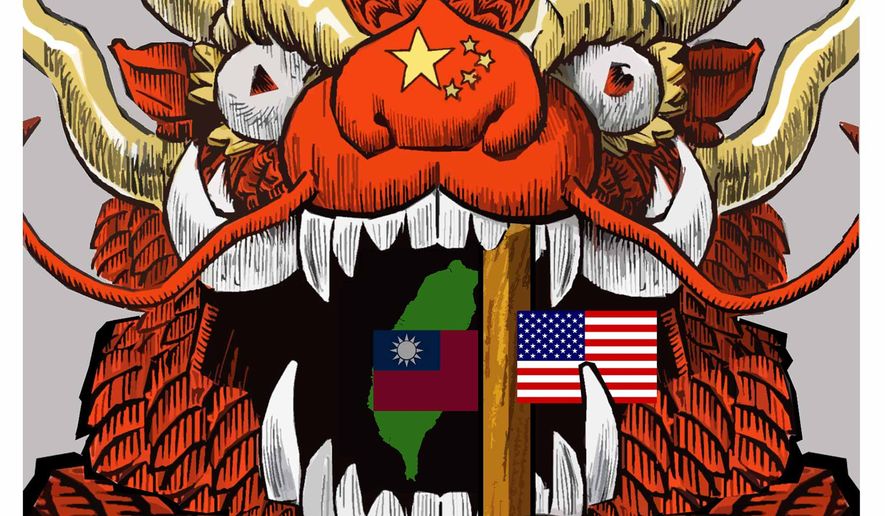OPINION:
Global geopolitics is changing rapidly. Russia’s invasion of Ukraine has evolved into an informal alliance between Vladimir Putin and Beijing’s authoritarian regime. And at the same time, China has made clear that it’s willing to use military force to secure Taiwan.
In the face of China’s growing aggression, some in Washington are calling for a U.S.-Taiwan free trade agreement. Yes, Taiwan is an important partner for the United States. But pursuing a free trade agreement would be a mistake in U.S. efforts to support Taiwan. Trade deals are simply an ineffective tool for political-military strategy, and obligating the U.S. to yet another free trade agreement could hamper wider efforts to rebuild America’s domestic manufacturing base.
It actually makes little sense to think that a trade agreement between any two nations could somehow deter a third-country aggressor. Recent events make this clear; Ukraine’s extensive trade with both the European Union and the United States did not deter a Russian invasion.
Ideally, what the United States could offer Taiwan is a secure, economically stable partner with a strong industrial base. When the United States served as the world’s “arsenal of democracy” during World War II, it was because America’s factories were able to churn out vast amounts of weapons and munitions. This has remained a bedrock fundamental of Western security in the ensuing 70 years.
America’s industrial security, however, has declined significantly over the past 20 years. A 2020 Pentagon assessment noted that even as China continues to build up its naval and land forces, America’s military has become increasingly dependent on China for microelectronics and rare earth minerals. And last month, it was reported that U.S. fighter jets are being built with an alloy supplied only by China.
At the same time, the United States continues to run massive global trade deficits. Last year, the U.S. international goods trade deficit exceeded $1 trillion for the first time. Included in that were both a $40 billion trade deficit with Taiwan and a $353 billion trade deficit with China.
Such massive outflows of U.S. capital are the inevitable consequence of failed trade policy. It’s hardly likely, then, that a new free trade agreement with Taiwan would in some way shift this balance — and halt the hemorrhaging of America’s high-tech industries. That’s particularly true of semiconductors — where Taiwan leads the world in computer chip production, even as the United States falls further behind.
Overall, a free trade agreement with Taiwan would offer little for America’s strategic economic interests. The U.S. already has strong trading opportunities with Taiwan, and there is no need to lower tariffs much further — since average tariff levels in Taiwan are already quite low. And the United States currently imposes an average import tariff rate on industrial goods of only 2.0%.
Washington must be objective about trade with Taiwan. That’s because Taiwan has a long history of currency manipulation — and is currently on the Treasury Department’s list of countries known to intervene in foreign exchange markets. Taiwan also consistently subsidizes its industrial sector. It’s likely that in any trade deal, Taiwan would seek preferences for its home industries — something that would defeat the very purpose of reciprocal trade.
If China were to attack Taiwan, it would almost certainly involve an economic blockade of the island — something that could greatly interrupt U.S. supply chains. Because Taiwan manufactures 90% of the world’s most advanced computer chips, a trade agreement would likely increase America’s over-reliance on Taiwanese semiconductors — not lessen it.
The best way to support Taiwan is with diplomatic and military tools, particularly through sales of military equipment. And at the same time, the U.S. should look to defund China’s ability to wage war. This is particularly relevant in the financial arena, where numerous Chinese entities continue to raise capital from U.S. retail investors and retirement funds. There is no reason why U.S. capital should be funding Chinese companies that build weapons for potential use against Taiwan.
The United States should embrace a strong, secure Taiwan with the backing of a dominant U.S. military and industry. However, a free trade agreement would not beef up Taiwan’s security, and will only serve as a potential, further drain on U.S. manufacturing capabilities. Instead, the best way to support Taiwan is to pursue measures that can defund China’s ability to wage war while securing America’s future industrial stability.
• Michael Stumo is CEO of the Coalition for a Prosperous America. Follow him at @michael_stumo.




Please read our comment policy before commenting.